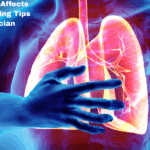
Living with asthma can be challenging, but with the right strategies, you can significantly improve your quality of life and effectively manage your symptoms. This article explores proven techniques to help you lead a healthy and active life despite your asthma condition.
Understanding Asthma
Asthma is a chronic respiratory condition that affects the airways, causing them to become inflamed and narrow. This can lead to symptoms such as wheezing, shortness of breath, coughing, and chest tightness. Effective management is essential to control these symptoms and prevent asthma attacks.
Identifying Triggers
Triggers, such as allergens, respiratory infections, and irritants, can exacerbate asthma symptoms. By identifying and avoiding these triggers, you can significantly reduce the frequency and severity of your symptoms. Consider the following steps:
- Allergen Management: Keep your living space clean and free from dust mites, pet dander, and mold. Use allergen-proof bedding and covers to minimize exposure.
- Irritant Avoidance: Steer clear of strong odors, smoke, and chemical fumes. Ensure proper ventilation in your home to prevent the buildup of indoor pollutants.
- Respiratory Hygiene: Wash your hands frequently to prevent infections, and consider getting vaccinated against flu and pneumonia to protect your respiratory health.
Medication Management
Working closely with your healthcare provider is crucial in developing an effective medication management plan. Asthma medications are generally categorized into two types:
- Long-term Control Medications: These medications, such as inhaled corticosteroids, help prevent inflammation in the airways and keep asthma symptoms under control daily.
- Quick-Relief (Rescue) Medications: Short-acting bronchodilators provide immediate relief during asthma attacks by relaxing the airway muscles and easing breathing.
Creating an Asthma Action Plan
An asthma action plan is a personalized guide that outlines the steps you should take to manage your symptoms and handle worsening conditions. This plan helps you recognize early signs of an asthma attack and provides instructions on adjusting your medication accordingly.
Lifestyle Adjustments
Incorporating certain lifestyle adjustments can significantly enhance your ability to manage asthma:
- Regular Exercise: Engage in physical activities that suit your condition, such as swimming or walking. Regular exercise can improve lung function and overall well-being.
- Healthy Diet: Consume a diet rich in fruits, vegetables, whole grains, and lean proteins. Omega-3 fatty acids, found in fish and flaxseed, have anti-inflammatory properties that can benefit asthmatics.
- Stress Management: Practice relaxation techniques like deep breathing, yoga, or meditation to reduce stress, which can trigger asthma symptoms.
Monitoring and Prevention
Consistent monitoring of your asthma symptoms and lung function is crucial. Keep a record of your symptoms, peak flow measurements, and medication usage. Regular check-ups with your healthcare provider can help in adjusting your treatment plan as needed.
Transitioning to Adulthood
Young adults with asthma may face unique challenges when transitioning to independence. Ensure you continue to prioritize your health by managing stress, maintaining a healthy lifestyle, and regularly consulting with your healthcare provider.
Summary:
In conclusion, living with asthma requires a proactive approach involving understanding your condition, avoiding triggers, effective medication management, creating an action plan, making lifestyle adjustments, and consistent monitoring. By embracing these strategies, you can take control of your asthma, improve your quality of life, and reduce the impact of symptoms on your daily activities. Remember that working closely with healthcare professionals is crucial to tailor your management plan to your specific needs.




